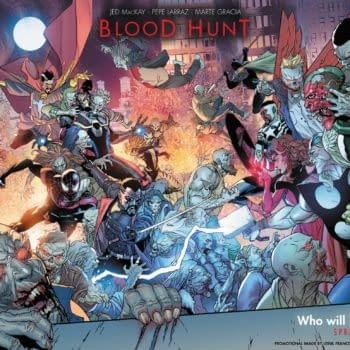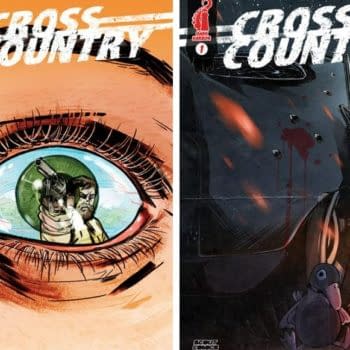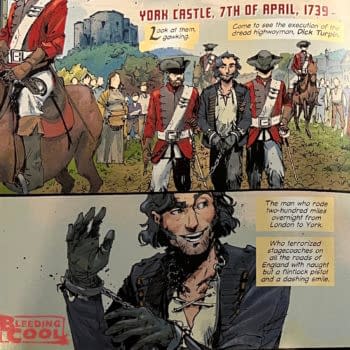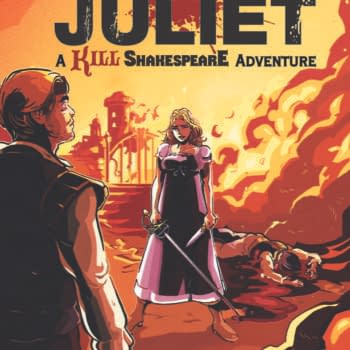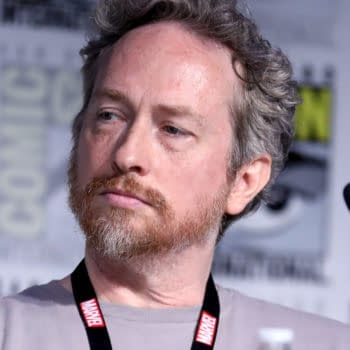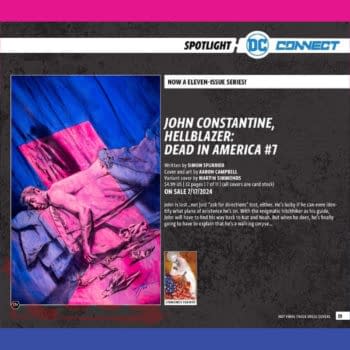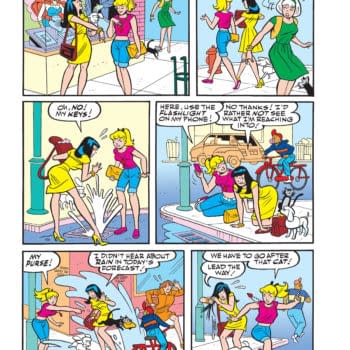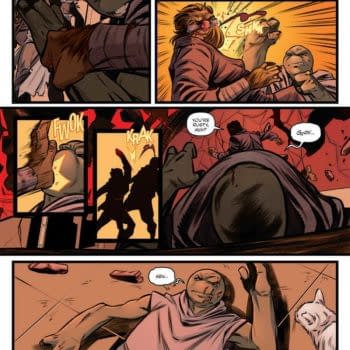Posted in: Comics | Tagged: baltimore, comic con, Comics, louise simonson
Geek Girl on the Street Reports: Talking With Louise Simonson
The beauty of the Batgirl of San Diego, is that without knowing she was doing so, Kyrax2 started a really interesting conversation online about the role of women as creators and fans of superhero comics. In reflecting on my chat with her, the main questions I was left with rolling around in my head -as a comic book journalist and would-be comic creator- were "Why aren't there more women creators writing/drawing superhero comics?" And, "What can the industry do to make superhero books more appealing to female creators and fans?" These questions presented a really great opportunity for me to come and talk to female creators who are and have been working in the superhero genre for years, to hear what they have to say about being a woman in the superhero genre.
Louise Simonson has been working in the comics industry for as many years as I've been alive. Starting her career at Warren Publishing, she later moved onto Marvel where she was noted for working on seminal titles in the 1980s such as Power Pack, X-Factor and Superman: Man of Steel. Despite her own protestations otherwise, Weezie (as she's affectionately referred to by her friends) is not only a role model for women – But, THE actual role model for 90% of women working in comics today. I had the distinct pleasure to sit down and talk to her at Baltimore Comic Con a couple of weeks ago. Below is our chat.
In the 1970s there were a very small number of women writing comics. Between now and then, how do you feel the representation of women in the comics industry has changed? For the better, for the worse, or has it stayed the same… ?
Well, you know what, if you count superheroes, it's probably about the same. You figure the volume of comics, percentage wise, to the volume of women [working in comics] and it is about the same. There are some really, really, really good women doing comics now even in the superhero genre, and the independent comics – there are great women who are doing a lot of really amazing independent comics that are of interest to women, who don't necessarily want to see a couple of big guys slugging it out for 22 pages. They are character stories, quite often, not always – but, quite often – and, some of them are funny, and they're just human interest stories that women and other people might find more interesting than superheroes. It's nice to have the genre of comic books be more open to other genres.
As far as women creators are concerned, how has it changed to be a woman in the comics industry from when you started to today?
I don't know what it's like for people getting their feet in today, because I didn't – you'd have to ask some of the younger women what the experience was like and then compare the two. I mean, my experience was a good experience, it wasn't what [other women] experienced…
I started off at Warren [Publishing], I started off in production. Then I was moved over to editorial, I was made an assistant editor, they made an assistant editor position for me, specifically, because I was much better at it than production. Then several years later, I essentially twisted James Warren's arm into giving me the line of books as an editor. At that point, I wasn't involved in mainstream comics, I mean, I had friends in mainstream comics – but, it just never occurred to me to me that women didn't do mainstream comics! It never crossed my mind. When I went to tell Warren I wanted to take over the line of books, after Bill Dubay left [in 1982], Warren said to me "Girls can't do superhero comics." Girls, not women, "girls can't do superhero comics." Now, Warren is a character, he loves pushing people's buttons, he loves to see them jump.
I know a few people like that.
It didn't even offend me, personally, I just kind of rolled my eyes and said, "Look, I will edit the line for six months on my Assistant Editor salary and I will get it done, I will get it done on schedule."
And, this guy's not stupid, he basically said "How much money am I saving by doing what you'd be doing anyways?" So of course I did it and then he made me the editor of the line, then he made me a Vice President and I was a big fish in a little itty bitty pond.
I kind of love that, though, being the big fish in the little pond. It's fun.
It's nice for a while, anyways. I loved working at Warren, it was a wonderful experience! And, then when I got hired over to Marvel, it hadn't occurred to me until someone pointed it out that it was a boys club. You know, I just kind of did what I did and those guys did what they did and it never really penetrated – I was naïve or stupid or something…
Or, you were focused on the job, which is the way it should be.
It never even occurred to me, it never even crossed my mind.
It sounds to me, that because you were so focused on being the best person to do the job, that gender didn't really play into your career?
It never even occurred to me. Then later on when I started writing and I created Power Pack, I got June Brigman to be the artist on it. She came to my office looking for work and I didn't have work on any of my books, but she could draw kids and she drew really beautiful kids. So I said, "Alright do some sketches of kids and if they're right I'll present us as a team and maybe [Marvel] will give us a little mini-series."
Honestly, it was only last year that someone said to me, "Oh yeah, [Power Pack] was one of those girl comics."
A girl comic?
That women created it! It never occurred to me that June was a woman. I was like, she's a woman? What? But, she does these great little kids, most people in comics can't do kids – the superhero body is so different from a kid's body, that their kids just look like little dwarfs. So, June – it just never occurred to me!
Let me follow up and let's talk about your experiences at Marvel: One of the assertions which Kyrax2 has made is that she thinks that a lot of women don't work at the "big two" because there is an unspoken networking thing that goes on in order to get jobs… And, that when a guy does that to another guy, it's fine – but, if a woman does that to a man that it's perceived as flirtation or a sexual advance. Did that type of interaction come into play at all for you while you were at Marvel?
I was always kind of one of the guys. Now, Jim Shooter hired me away from Warren. When Shooter asked me [to come to Marvel], it looked like Warren was less interested in the comics and had other interests and it looked like time to move to Marvel, so I did. Shooter hired several women, as editors, I think I'm the only one who stuck – I mean it was a tough room to be in, but Shooter was much more open than many of the guys are today, even. Though I'll probably get in trouble for saying that…
No you won't, because everyone loves you.
Oh thank goodness! I think that not every guy has this prejudice, but there are guys in comics who want it to be a dude thing. That's kind of okay, because I think that the women are going to go over and do their own thing and then [the guys] are going to be wanting to get in on our [projects]. So, nyah! Girls can have their own clubs, too.
Honestly, I think the women who make it in superhero comics don't make it because they're as good as the guys, they make it because they're better than the guys. You have to be. You have to be smarter, you have to work harder…
You do have to be better, you have to be tougher, too.
You do, you have to be tougher.
It's interesting to me, because, the successful women who I talk to in the industry say the same thing, that yes, that kind of weird gender dynamic does exist, but no, they haven't really experienced it… because that kind of gender thing just kind of rolls off their backs…
I think that there is something about the way I am, that I never noticed that happening. Maybe it's because I've been married to Walter for so long – and was his girlfriend for a long while – so, I don't know if that was a protective forcefield around me… I just never ran into anything like that.
I run into fans that are [more biased about women in comics] than the actual professionals. I mean, I have a great time with those guys – I can sit and talk about comics as well as anyone and I'm comfortable in a room with dudes. I don't know, maybe it's because I grew up with two smart-ass brothers and a smart-ass dad?
I don't even notice.
Me, too.
I do have to say, I did work for Jim Warren first and after you work for Warren and his personal brand of craziness, and I do love the guy, even though he's occasionally over the top, working with anyone else was pretty easy.
Also, working with Warren was kind of an honor in the way that he had a real eye for talent. You figure, if he's going to give you a chance you have to be really, really good at it. In a way it's like trial-by-fire?
That's how I feel. When people say to me "you're a crappy writer" I have to remind myself, no I'm not, otherwise I wouldn't be writing for this website. You have to outshine everyone else in order to prove your worth and place in the organization. I friggin' share a masthead with Warren Ellis, for cryin' out loud!
Exactly. Just say, nyah!
I've also heard people say that as a woman it's harder to work for women than it is to work for men. How do you feel about that statement?
I don't think that I've ever worked with a woman editor. There aren't that many of us.
No, there aren't that many. I was talking with Joan Hilty and she said that there aren't that many [women editors in superhero comics].
I don't think I ever have. I've had women work for me – Ann Nocenti, was my assistant before she took over X-Men line, after I left. And, she was great, I would have happily worked for her if she had been my boss. Oh wait, she was, I did work for her! Obviously it made no difference, as I didn't even look at her as female.
That's a statement of being awesome, because gender is so omnipresent in everything we do in this industry in a way that guys don't get. "Oh, you're a girl in comics, etc." And, not noting one's gender is really a high compliment [to a woman].
Ann was awesome, she was so-much just an editor, that it never occurred to me [to assign gender to her]. Tom was Tom, Carl was Carl and Ann was Ann. I also worked for Bobby Chase on a She-Hulk arc, a Galactus-Silver Surfer story, and a Warlock miniseries.
Why do you think that there are less female creators who want to write and draw superhero books?
Because there are less women who read superhero books and I think one thing feeds the other. Though there are a lot more than there used to be, you see it when you go to these conventions.
What do you think that publishers could do to make writing, creating and reading superheroes more attractive to women?
It might help if they hired more women. And, I don't understand why superhero comics are such a boys club? Other types of publishing have huge female readerships. In normal book publishing the female readerships are bigger than the male readerships – it's 60/40. But, in comics it's like 30/70, or back in the day it was even 10/90…
If you had to pick one classic superhero to bring back into the modern era and reintroduce to the world, who would it be?
Well, I don't know who is alive and who is dead…
Let's just say you can resurrect anyone.
Oh my goodness. I have no idea. I don't know if I'm familiar with the old Golden Age people enough to know… Honestly, probably one of the ones I killed, Magik – she's Bronze Age and she was wonderful.
If you were walking into an editor's office to pitch a new female superhero, what would she be like?
She would be smart, she would be determined, she would be courageous, she would have some flaw – because it's always more interesting to have a character with a flaw.
Yeah, because humans have flaws and they're beautiful.
The fun of having a character with a flaw is it gives you something else [other than their superpowers] to do a story about. And, sometimes a virtue which is pushed too far can also turn into a flaw, and that's fun to work with. And, of course, I'd come up with some cool power. And, that would be the end!
What advice would you give to young women who want to be writers and editors in the comics industry today?
Study everything you can, be really smart, be lucky, grow a thick skin, be the best you can be at everything you do. Don't goof off on anything. Every job you do has to be the absolute best you can do… it doesn't have to be better than other people's work, just the best YOU can do.
Thank you, Weezie – this means a lot to me and I think it will mean a lot to all the people who read my column, too.
You're welcome!
Next week tune in for an interview with former DC Editor, Joan Hilty.
Kate Kotler is the founding editor of Geek Girl on the Street.com, a writer of the "Daily Dozen" for Wizard World Digital and a full time geek girl who lives in Chicago. She loves Doctor Who, Frank Miller, Wonder Woman, knitting, puppetry and she used to be a professional fire eater. See her full resume on katekotler.com. You can Tweet at her @adorkablegrrl on the Twitters.






